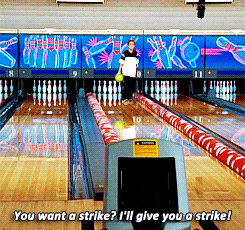Life is like a rollercoaster. It has its ups and downs, and it only stops when you turn off the switch. Forget and forgive; Live and learn; One team, one fight; I am the sexiest person in whatever room I walk into and there is nothing you bitches can do about it. Nicknames: "Two Pump Chump", "Wild Card", "Jack of All Trades" Steam: firesaga500 Skype: firesaga500 LoL: Godoka FFXIV: Sad Turnip (Balmung); Una'to Relanah (Balmung) Tiger Millionaire (Balmung)
Don't wanna be here? Send us removal request.
Photo








Samuel “Jetstream Sam” Rodrigues Appreciation Post
4K notes
·
View notes
Photo

wOOHOO~! Lots of fun coloring this. yuppers
2K notes
·
View notes
Video
vine
Realizing you’re stuck babysitting a crazy ass kid…
149K notes
·
View notes
Photo




This Baltimore city councilman nailed the real reason behind the riots
As riots continued to engulf Baltimore Monday night, a City Council member spoke to a Fox News reporter and quickly got to the real root of why these protests are happening. Councilman Nick Mosby told Fox the issues which sparked the violence run much deeper than the death of Freddie Gray — and even stressed the most important thing to remember about the riots and the protests.
59K notes
·
View notes
Photo










The Last Of Us S C E N E R Y Concept Art
5K notes
·
View notes
Text
The side of the Baltimore riots you won’t see on TV:





On Monday, the media was quick to paint a single picture of Baltimore: a chaos scene of violence and mayhem filled with images of looting, rioting, the burning of a CVS and the torching of a police car. But on the ground, a very different story unfolded — and these remarkable photos and videos are proof.
255K notes
·
View notes
Link

discussions of #suicide, #transmisogyny (note that the bottom of the full article contains screenshots of the harassment)
Online trolls urged trans game developer Rachel Bryk to jump off a bridge. She did.
Gaming communities across the Internet are mourning the death of prominent transgender game developer Rachel Bryk, who committed suicide on April 23, after suffering from a lifetime of health problems and months of anonymous cyberbullying. Bryk, 23, was plagued by chronic pain, as well as low self-esteem, long before she joined any online communities, but it was an anonymous harasser who urged her to jump off a bridge—just days before she took her own life by jumping from the George Washington Bridge in New York City.
Read more
Read the commemoration from the Dolphin development team
when does it stop
18K notes
·
View notes
Photo

Lowest US science spending since WWII ‘threatens America’s future’ – MIT
Scientists at the Massachusetts Institute of Technology have warned of an “innovation deficit” stemming from a decline in federal government spending on basic scientific research in areas such as cybersecurity, space exploration, and infectious diseases.
The report entitled “The Future Postponed” was released Monday in an effort to highlight steady decreases in the budgets of the US National Institutes of Health and other top research agencies.
Federal spending on research as a share of total US federal government outlays is now at about 3 percent, down from 10 percent in 1968, during the height of the space program.
Federal investment in scientific research is “the lowest it has been since the Second World War as a fraction of the federal budget,” said MIT physicist Marc Kastner, leader of the report committee. “This really threatens America’s future.”
As a share of the gross domestic product, federal science funding is just under 0.4 percent.
The report begins by listing some of the top scientific highlights of 2014, including the landing of a spacecraft on a comet and the development of the world’s fastest supercomputer. Yet those two achievements – by the European Space Agency and China, respectively – and the others mentioned all occurred outside the US.
Areas of research that are lacking, the report said, include cybersecurity, space exploration, plant sciences, fusion energy, infectious diseases, defense technology, and robotics.
MIT explained that it chose these fields based on their status as: “opportunities with high potential for big payoffs in health, energy, and high-tech industries; fields where we risk falling behind in critical strategic capabilities such as supercomputing, secure information systems, and national defense technologies; areas where national prestige is at stake, such as space exploration, or where a lack of specialized U.S research facilities is driving key scientific talent to work overseas.”
The report attempted to show how, in the past, research investments like the ones MIT is calling for have been made and later proved to be successful for one reason or another.
“America’s emergence last year as the world’s largest oil producer has been justly celebrated as a milestone for energy independence,” the report insisted.
“But the roots of the fracking revolution stem from federally-funded research—begun in the wake of the first OPEC oil embargo 40 years ago—that led to directional drilling technology, diamond drill bits tough enough to cut shale, and the first major hydraulic fracturing experiments. Do we also want the U.S. to be a leader in clean energy technologies a few decades hence, when these will be needed for large scale replacement of fossil energy sources, a huge global market? Then now is when more investment in advanced thin film solar cells, new battery concepts, and novel approaches to fusion energy should begin.”
The report does not offer specific cost projections or policy prescriptions to achieve better funding for these areas.
“It’s fine to talk about research opportunities,” Michael Lubell, director of public affairs at the American Physical Society, told Reuters. “But the report is long on identifying needs and short on identifying policy that will get us there.”
Past surveys have shown Americans’ knowledge of basic science to be lacking compared to other developed nations. For example, in a February 2014 study, one in four American respondents did not know that the Earth revolved around the Sun. Though that same survey found that more than 90 percent of Americans are of the opinion that scientists are “helping to solve challenging problems” and are “dedicated people who work for the good of humanity.”
source
129 notes
·
View notes
















